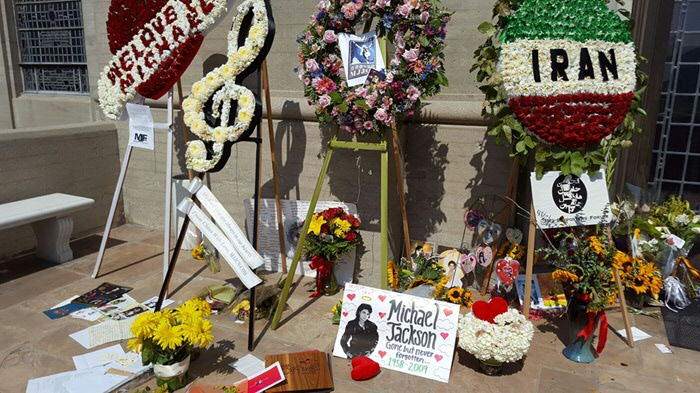‘There’s no bridge too far in the quest for proximity to Michael Jackson.’
This is it is the title of Fardo Eringa’s dissertation – entitled after the well-known documentary about the ‘King of Pop’ Michael Jackson, which was released shortly after his death in 2009. Eringa has been a Jackson fan herself since her youth, but she is far more fascinated by the large movement of female fans who use Jackson as a moral compass in their daily lives.

Self-development and activism
‘Following an artist can provide order to life, give meaning, and stimulate activism,’ concludes Fardo Eringa, among other findings, in her dissertation. In her research, she focused on a group of fans – ‘MJ pilgrims’ – who regularly visit ‘Michael spots’. She analysed the role played by Michael Jackson in their lives by studying the impact of the pop star on the life principles and individual and group identities of his followers. Eringa’s study of ‘Michaeling’ – as she has termed the memorial practices organized by MJ fans to commemorate him in the wake of his death, to express their devotion, and to provide space for their loss – shows how ‘fandoms’ can form the basis of moral self-development and collective action. The subtitle of her dissertation therefore follows: Worldviews and fandom of female Michael Jackson-pilgrims and their journeys towards living Mike-like.
Emerging field within religious studies
Eringa’s research into the new forms of purpose and meaning in life in a secularized culture is part of an emerging field within religious studies. The main question underlying her research is what the study of ‘Michaeling’ can tell us about the ways in which current society uses fandoms, religious-cultural heritage, and new media as sources for establishing a worldview, sacred forms (matters that people regard as the ultimate truth and as essential to life itself), and a moral self. ‘During my MA thesis on “Michaeling”, I got into contact with a number of women with whom I ended up attending the “Michael Week”, the annual pilgrimage that takes place in the week around the date of Jackon’s passing, twice. No bridge appeared to be too far in their quest for proximity to Jackson. I used the experiences of these 26 MJ pilgrims as the basis for my dissertation,’ she explains.
Popular culture as an important source of inspiration for contemporary purpose and meaning
According to Eringa, these women have committed themselves to using Jackson as a moral compass in their daily lives: ‘I found it fascinating to see how the women consciously chose to follow Jackson as a source of inspiration in their lives. Inspired by his life and music, they attempt to improve themselves and the world around them. They use Jackson’s music to guide their emotions and moral compass and to experience a sense of spirituality. The memorial rituals involved in “Michaeling” show that precisely now, in our current, culturally heterogeneous society, it is important to devote attention to tradition as well as change, which, as this dissertation demonstrates, often merge in a person’s worldview.’
Using a fandom as a concrete case study, she argues that so-called popular culture is an important source of inspiration for the establishment of purpose and meaning in life in today’s society: ‘Through fandoms, people communicate about who they are, what they believe and do, and why. At the same time, society still regularly draws from religious (including Christian) heritage, be it consciously or unconsciously. My dissertation shows the complexity of fandoms. With the help of a narrative, biographical approach, I show that MJ pilgrims intentionally use their fandom to shape their worldviews and to cultivate an activist disposition.’
‘Not a replacement for religion’
She continues: ‘This study also underlines the importance of popular culture – more specifically, celebrity fandoms and popular music – as a research topic in the study of contemporary purpose and meaning in life in the West. An important finding is that fans do not see their fandoms as a replacement for religion, but as a way of expressing a worldview. The stories of fans show that tradition persists, but they also demonstrate the influence of new media, such as the Internet, in generating and expressing transcendent experiences. These are new forms of connection that teach us more about how purpose and meaning in life is established and expressed nowadays.’
Relationship of trust
Eringa has been a fan of Jackson herself since her youth – albeit in a different manner than the women in her research. ‘My personal interest really lies in the music. That being said, I am also entranced by the elusiveness of Jackson as a person, with all his contradictions. Having knowledge of his songs and video clips has really helped me in my research. It has led to a relationship of trust with the other fans, and I understood their references to him. In addition, being a fan myself gave an extra boost to my fieldwork experience: I also found it special to stand at the places where Jackson had stood,’ explains Eringa.
PhD ceremony
On Thursday 7 October, Fardo Eringa will defend her thesis, entitled This is it: Worldviews and fandom of female Michael Jackson-pilgrims and their journeys towards living Mike-like, during her PhD ceremony in the presence of her supervisor Prof. Marjo Buitelaar, Professor of Contemporary Islam, and joint supervisor Dr Mathilde van Dijk, assistant professor of the History of Christianity and Gender Studies at the Faculty of Theology and Religious Studies of the University of Groningen. Go for it, Fardo!
When: Thursday 7 October 2021
Starts at: 12.45 p.m.
Where: Academy Building
Live stream: You can follow the ceremony by livestream via this link.

| Last modified: | 26 February 2025 10.52 a.m. |
More news
-
05 March 2025
Women in Science
The UG celebrates International Women’s Day with a special photo series: Women in Science.
-
10 February 2025
Project GRACE: An ENLIGHT ETN Grant Winner
We are happy to announce that the project GRACE, with Julia Martínez-Ariño as the main coordinator, is one of the projects selected for the ENLIGHT 2024 Call. Congratulations to the GRACE team.
